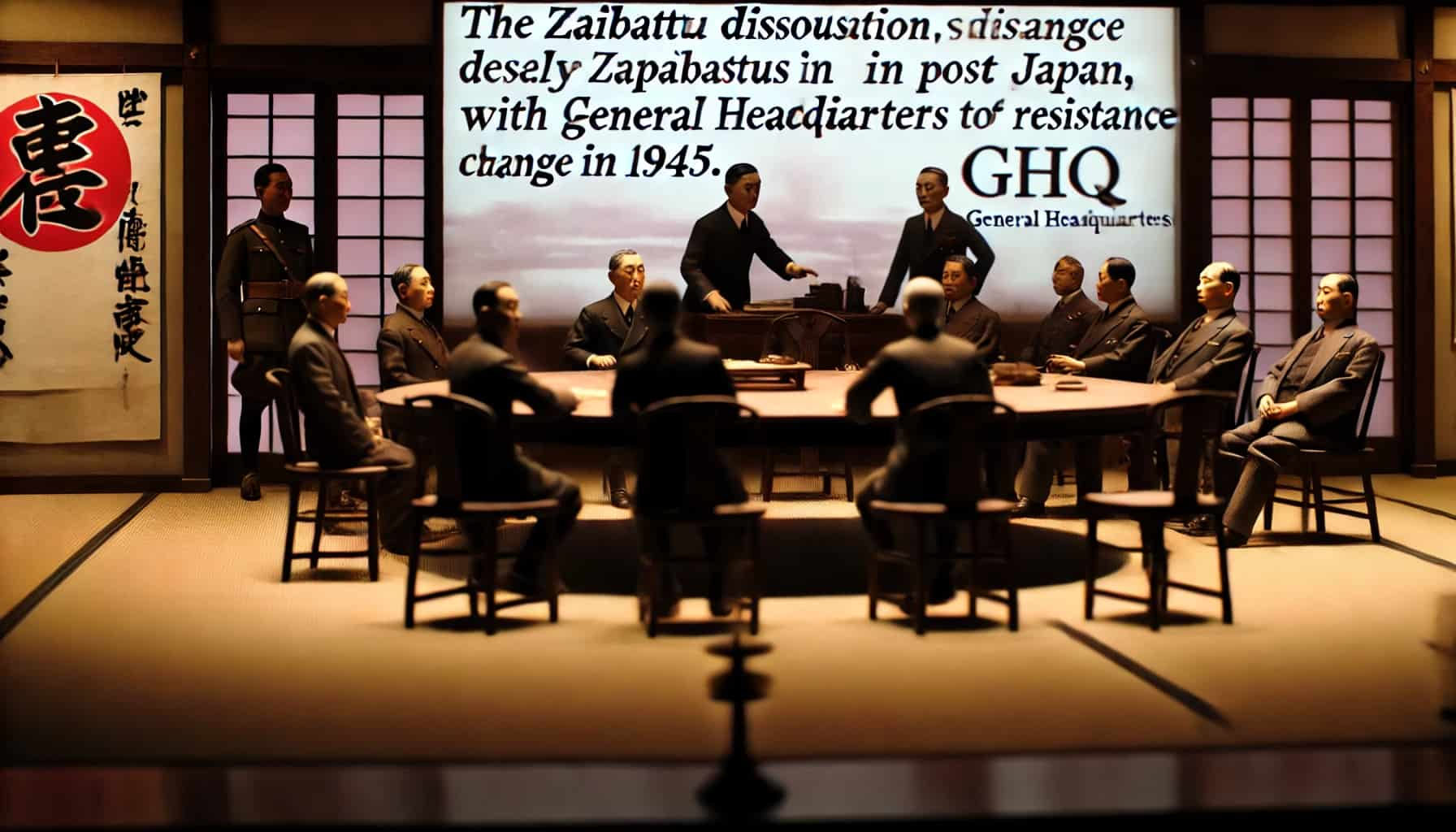GHQ’s Post-War Zaibatsu Dissolution in 1945
この英語教材のテーマは「実際の出来事でカジュアルな英語を学ぶ」
The theme of this English resource is “Learn casual English through real events.”
Section 1: The Beginning of Zaibatsu Dissolution
On November 6, 1945, shortly after the end of World War II, the General Headquarters (GHQ) began the dissolution of Japan’s zaibatsu. Zaibatsu were large family-owned business conglomerates that had considerable influence over the Japanese economy. The dissolution was part of GHQ’s reforms to decentralize economic power in Japan and create a more democratic society.
Q1: When did GHQ begin the dissolution of the zaibatsu?
Sample Answer: GHQ began the dissolution of the zaibatsu on November 6, 1945.
Q2: What were zaibatsu?
Sample Answer: Zaibatsu were large family-owned business conglomerates that had significant influence over the Japanese economy.
Q3: Why did GHQ dissolve the zaibatsu?
Sample Answer: GHQ dissolved the zaibatsu to decentralize economic power in Japan and promote a more democratic society.
Now, let’s talk using idioms.
・Let the students choose one favorite idiom and make an example sentence.
Idiom Explanation: “Shortly after”
Shortly after means a short time after something happens.
Example Sentence: GHQ began the dissolution of the zaibatsu shortly after the end of World War II.
Section 1: 財閥解体の始まり
1945年11月6日、第二次世界大戦終結直後、連合国軍総司令部(GHQ)は日本の財閥解体を開始しました。財閥とは、日本経済に大きな影響を持つ大規模な家族経営の企業コングロマリットでした。財閥解体は、日本の経済力を分散させ、より民主的な社会を作るためのGHQの改革の一環でした。
Q1: GHQが財閥解体を開始したのはいつですか?
サンプル回答: GHQは1945年11月6日に財閥解体を開始しました。
Q2: 財閥とは何ですか?
サンプル回答: 財閥は、日本経済に大きな影響を持つ大規模な家族経営の企業コングロマリットです。
Q3: GHQはなぜ財閥を解体したのですか?
サンプル回答: GHQは、日本の経済力を分散させ、より民主的な社会を促進するために財閥を解体しました。
イディオム解説: “Shortly after”
Shortly after とは、何かが起こったすぐ後の短い時間を意味します。
例文: GHQは第二次世界大戦終結直後に財閥解体を開始しました。
Section 2: The Challenges of Zaibatsu Dissolution


The dissolution of the zaibatsu was not a simple process. Many zaibatsu had deep roots in the Japanese economy and were resistant to change. GHQ faced resistance from business leaders, and the process required significant restructuring of companies. However, the determination of GHQ and the support from reform-minded Japanese officials ensured the dissolution moved forward.
Q1: Why was the dissolution of the zaibatsu challenging?
Sample Answer: The dissolution was challenging because many zaibatsu were deeply rooted in the Japanese economy and resistant to change.
Q2: Who resisted the dissolution efforts?
Sample Answer: Business leaders resisted the dissolution efforts.
Q3: What helped GHQ move the dissolution process forward?
Sample Answer: GHQ’s determination and the support of reform-minded Japanese officials helped move the process forward.
Now, let’s talk using idioms.
・Let the students choose one favorite idiom and make an example sentence.
Idiom Explanation: “Deep roots”
Deep roots means having a strong, established connection or influence in something.
Example Sentence: Many zaibatsu had deep roots in the Japanese economy, making the dissolution challenging.
Section 2: 財閥解体の課題
財閥の解体は簡単なプロセスではありませんでした。多くの財閥は日本経済に深く根付いており、変化に抵抗していました。GHQは企業のリーダーたちからの抵抗に直面し、企業の大幅な再編が必要でした。しかし、GHQの決意と改革志向の日本の官僚の支援により、解体は前進しました。
Q1: なぜ財閥の解体は困難だったのですか?
サンプル回答: 多くの財閥が日本経済に深く根付いており、変化に抵抗していたため、解体は困難でした。
Q2: 誰が解体の取り組みに抵抗しましたか?
サンプル回答: 企業のリーダーたちが解体の取り組みに抵抗しました。
Q3: GHQが解体プロセスを進めるのに役立ったのは何ですか?
サンプル回答: GHQの決意と改革志向の日本の官僚の支援がプロセスを進めるのに役立ちました。
イディオム解説: “深く根付く”
深く根付く とは、何かに強い、確立されたつながりや影響を持つことを意味します。
例文: 多くの財閥が日本経済に深く根付いていたため、解体は困難でした。
Section 3: The Impact of the Zaibatsu Dissolution

The dissolution of the zaibatsu had a profound impact on Japan’s economy and society. It broke up the concentration of economic power and allowed for more competition among businesses. The reforms also paved the way for Japan’s economic democratization, which eventually contributed to the rapid growth of small and medium-sized enterprises. The dissolution was a key step in reshaping Japan’s post-war economy.
Q1: What was the impact of the zaibatsu dissolution on Japan’s economy?
Sample Answer: It broke up the concentration of economic power and allowed for more competition among businesses.
Q2: How did the dissolution contribute to economic democratization?
Sample Answer: The dissolution paved the way for Japan’s economic democratization and the growth of small and medium-sized enterprises.
Q3: What role did the zaibatsu dissolution play in reshaping Japan’s economy?
Sample Answer: The dissolution was a key step in reshaping Japan’s post-war economy.
Now, let’s talk using idioms.
・Let the students choose one favorite idiom and make an example sentence.
Idiom Explanation: “Paved the way”
Paved the way means to create a situation in which something can happen or develop more easily.
Example Sentence: The zaibatsu dissolution paved the way for economic democratization in Japan.
Section 3: 財閥解体の影響
財閥の解体は日本の経済と社会に大きな影響を与えました。経済力の集中を解体し、企業間の競争を促進しました。この改革は日本の経済民主化への道を開き、最終的には中小企業の急成長に寄与しました。財閥解体は戦後の日本経済を再構築する上で重要な一歩でした。
Q1: 財閥解体は日本の経済にどのような影響を与えましたか?
サンプル回答: 経済力の集中を解体し、企業間の競争を促進しました。
Q2: 解体は経済の民主化にどのように貢献しましたか?
サンプル回答: 解体は日本の経済民主化への道を開き、中小企業の成長に寄与しました。
Q3: 財閥解体は日本の経済再構築にどのような役割を果たしましたか?
サンプル回答: 解体は戦後の日本経済を再構築する上で重要な一歩でした。
イディオム解説: “道を開いた”
道を開いた とは、何かがより簡単に起こる、または発展する状況を作り出すことを意味します。
例文: 財閥解体は日本の経済民主化への道を開きました。






